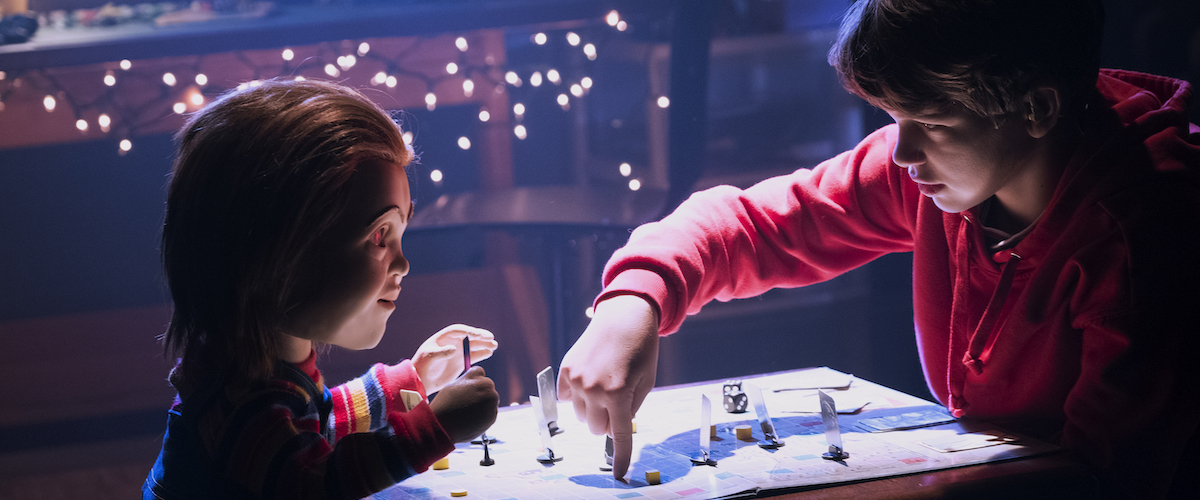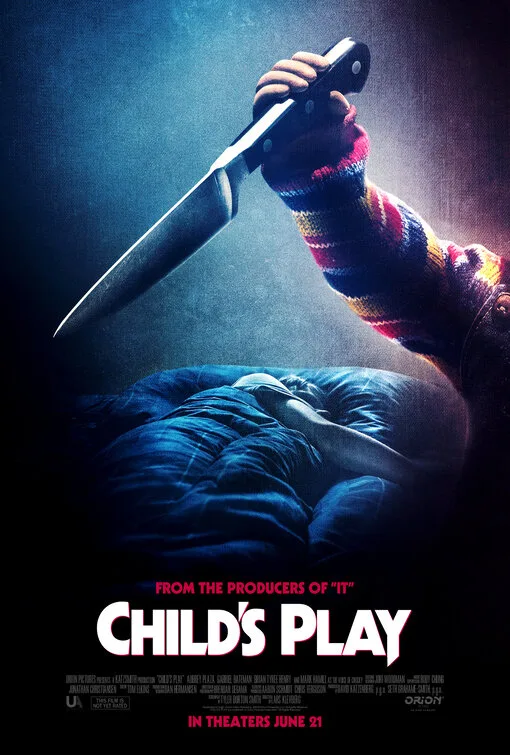A murderous plaything might be one of the stranger premises Hollywood has been able to franchise, and yet the “Child’s Play” movies have gathered a substantial following down to the 2017 direct-to-video movie, “Cult of Chucky.” A non-cynical reboot of the entire franchise, “Child’s Play” is still a bit wonky with its albeit ridiculous premise, but consider this movie beyond any allegiance to earlier versions of this tale—this “Child’s Play” is nastier, more playful, and just as good if not better than the original film.
Directed by Lars Klevberg and written by Tyler Burton Smith, this version tells of a tween named Andy (Gabriel Bateman) who receives a “Buddi” doll from his mother Karen (Aubrey Plaza), because he seems only able to make friends with the guy down the hall, Detective Mike (Brian Tyree Henry). In the winking attitude of the movie, Karen was able to get one of the dolls from her department store job because its “eyes were turning red,” and Andy doesn’t even like the present—he’s a little too old for it, and there’s already a sequel on the horizon, the Buddi 2. But it’s Chucky (voiced by Mark Hamill) who persists to be in Andy’s life, a doll designed to be your friend no matter what, and they bond during a very Pixar-lookin’ montage where Andy shows Chucky how to brush his teeth, or play a board game. Eventually, Chucky helps Andy befriend two neighboring fellow kids, Pugg (Ty Consiglio) and Falyn (Beatrice Kitsos), because Chucky can do goofy things like repeat naughty words.
It’s when people start making Andy unhappy (like Karen’s boyfriend Shane [David Lewis]) that Chucky unleashes the carnage you expect, although this time it’s out of love—he wants to protect Andy, so much as to own him. Instead, he makes Andy’s life hell, and as bodies start to pile up, Andy becomes frantic to get anyone to believe him that it’s the doll who is unleashing such carnage.
The original story by Don Mancini gets a 2019 update in two big ways—Chucky is now the product of an Amazon-like group called Kaslan, and is able to connect to nearly anything with a Wi-Fi signal, including TVs, other toys, cars, drones, etc. But while this “Child’s Play” starts to feel like another technophobic movie, it gets tension from trying to be slightly more believable as to how a Chucky could happen—no voodoo spells and soul transference here.
The other manner is that it’s clearly a product of the era that has seen big success with “It” and “Stranger Things,” basing its horror partly around the unlikelihood that lead kids like Andy and his friends Pugg and Falyn could die. Here, it’s a kid’s psychological torment that adults are then punished and murdered for. In a larger sense, “Child’s Play” creates a fun nightmare out of the “Toy Story” fantasy—that it’s horrifying to imagine a sentient play-thing like Woody would find a sole purpose in wanting to please their masters, especially if the toy is themselves obsessive and has no sense of boundaries.
“Child’s Play” is one of those rare modern horror remakes that is more inspired than it is soulless, a feeling you get from its grand finale, or even casting. Regarding the latter, Plaza and Tyree Henry bring their deadpan mastery to make “Child’s Play” funny in a surprising way without being campy. They also help create a little apartment world of lonely people—it’s that not different from Andy’s pain, or even that of Chucky’s. The jokes in the script don’t always work, but the film has a strong enough sense of humor that the movie can bank entire sequences with its humor, which helps its more insidious passages stand out even more in comparison.
Hamill has the unenviable task of going up against Brad Dourif’s franchise-defining performance as Chucky, but this version is distinctly different—Hamill’s Chucky is more like a whimsical child (he borrows the soft, high-pitched voice from his work in “Brigsby Bear”), and doesn’t have the venomous misogyny of Dourif’s incarnation. This vision of Chucky (squint and you might see Hamill’s blue eyes with red hair) is filled out by excellent puppet work, which makes Chucky seem like a full-functioning, believable robot product (except for unfortunate inserts where Chucky is imagined in CG). Even the music goes the extra mile to make Chucky feel creepy, as when Hamill sings Bear McCreary’s “Buddi Song,” a recurring lullaby that feels pilfered from a “Toy Story” montage.
Chucky’s inner journey to violence becomes more interesting as it charts an unpredictable course of events. It starts off comically straightforward at first, as we see a disgruntled, overworked programmer in Vietnam decide to shut down all of his safety protocols, before stuffing him in a box and sending him off. But we soon understand that Chucky learns from watching, as when he sees Andy and his friends laugh at the blood splatter in “Texas Chainsaw Massacre 2”—Chucky then walks back into the room holding a knife, thinking that creating violence himself would bring Andy happiness. Later on, “Child’s Play” kind of bungles this developing psychology and just has someone futz with his hardware, turning Chucky into a god-like killer with the capacity to control virtually any device. But it’s a testament to the movie’s quality that the biggest issues concern whether Chucky’s AI is thought out enough—where his programming ends and where some semblance of an evil conscience begins—though you might be having too much fun with the film’s giddy set pieces to notice.
As for the main reason people want to see a movie about a killer doll—the violence—“Child’s Play” capably implements Chucky as an instrument for gore, and any creepiness about his presence settles in as a result. Klevberg knows how to wind up some body horror too, so you feel it when bones pop out of flesh in a nightmarish way. And when Chucky pokes holes in a poor sap using a butcher knife, it’s startling beyond being iconic. There’s even a running gag with a corpse that’s so Troma-level I couldn’t help but imagine Lloyd Kaufman standing up in the middle of a multiplex audience and saluting the screen. If they do make another Chucky like this, I want it.




















